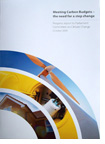 “This is a century in which we will recognise that living within your means can no longer just be about money, but also must be about first living within your carbon means and second living within the natural world’s ability to support humankind over issues like fishing and deforestation.”
“This is a century in which we will recognise that living within your means can no longer just be about money, but also must be about first living within your carbon means and second living within the natural world’s ability to support humankind over issues like fishing and deforestation.”
I took pleasure in the these words from UK Environment Secretary Hilary Benn, reported in the Guardian today, while realising that I open myself to the accusation of being too ready to credit that a politician can mean what he or she says.
Benn is calling for a way to be found to price the impact of our decisions on biodiversity in the same way that the international community is finding a way of pricing carbon. He warns that the world may be going through its sixth great extinction event. He’s hoping that a report being prepared for the European commission by the Deutsche Bank economist Pavan Sukhdev into the economics of ecosystems and biodiversity may “do for our understanding of the natural world what Nick Stern did for the understanding of the economic impact of climate change.”
“Stern made people sit up and take notice. Stern said ‘this is the cost of dealing with climate change and this is the cost of not dealing with it.’ Stern brought this issue to the attention of business people and economists. We have to realise we live in a world where we can no longer take without consequence”.
Earlier in the month Benn contributed an opinion piece in the BBC’s Green Room series explaining his biodiversity concern at greater length. He was careful to conjoin it with climate change: “Climate change and biodiversity are inextricably linked. We ignore natural capital at our peril.”
Benn is only saying what many scientists have been pointing out for some years. But it matters that politicians should be saying it. The general populace needs to hear it from them. It’s called political leadership and it has often mattered at critical times in the past. I commented in an earlier post on the willingness of the Milliband brothers and Gordon Brown to speak unequivocally about climate change to the UK electorate. John Prescott was similarly outspoken and active in the lead-up to Copenhagen.
Admittedly the Copenhagen experience was dispiriting in relation to the rhetoric we were increasingly hearing from political leaders beforehand. Benn will address that fact in a speech he is due to deliver tomorrow, when he will say that a way has to be found to reverse “the collective loss of personal, economic and environmental optimism”.
Our own political leadership is not given to statements like that of Benn’s which opened this post. I realise they make a virtue of not wanting to promise more than they can deliver, but the New Zealand electorate needs to hear unequivocally from the government (and from the main opposition party for that matter) that climate change and biodiversity loss are supremely important issues, with the corollary that our catching up with Australian incomes is a rather lesser matter.

 As a handy follow-up to Bryan’s
As a handy follow-up to Bryan’s  A sidelight to Gareth’s
A sidelight to Gareth’s  The UK’s
The UK’s